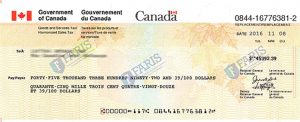Spring is in the air and with the warmer weather comes tax filling season, and all the promise of a healthy tax return. Over 53 per cent of Canadians are expecting to receive some sort of refund this year, but a recent survey found that over 60 per cent of those people didn’t realize that these refunds were in fact their own money that they are getting back. According to Canada Revenue the average tax return in 2018 was $1,580. While some might receive a higher or lower amount the prevailing idea is that most consider this refund as a ‘windfall of unexpected money’ or ‘extra’ money that wasn’t calculated in their monetary budget, and that’s the trap you want to avoid.
The notion of spending funds that are not part of your budget and therefore a bonus is understandable and common practice. Having the government give you back a lump sum of money is a feel-good moment that could open the door to numerous spending possibilities. However, take a moment to think about what the best financial course of action for you and your family is. Consider your financial plan and understand your needs and goals to achieve financial independence and security in both the short-and-long-term.
This year instead of taking a beach vacation or upgrading your entertainment system, why not use that money to improve your financial situation? It’s always easier to spend than it is to save, but consider the benefits of saving your tax refund and putting it to better use that will payoff in the long-term.
Don’t think of it as free money, think of it as your own money and make the most out of it.
Here are three things you can do with your tax refund that can have a lasting positive effect.
Pay down credit card debt
The idea of buy now, pay later sounds great in theory! Most credit cards carry a 20 per cent interest rate charge on the bill balance. Out of all the debt people have credit card debt tends to be the hardest to pay down and carries the highest interest rate along with harsh penalties for late or missed payments. By lowering the outstanding balance on your credit card, it will save you money every month as well as improve your credit score.
Pay down other debt
While high-interest debt can occur with credit cards, it’s important to pay attention to other debt you are carrying that can weigh you down. If possible, pay down car loans, existing lines of credit or personal loans. Any amount that is paid towards these will lower your monthly costs and give you the option to invest any extra funds that would otherwise have gone towards interest charges.
Invest for the future
This is where you can turn your tax refund into smart money that will continue to work for you and provide security for the future – contribute to a registered plan whether it be to a RRSP (Registered Retirement Savings Plan) or TFSA (Tax-Free Savings Account).
The sooner you start contributing to your RRSP the greater the payoff will be in the future and in the short-term it can provide a tax deduction for the contribution you make which may help in getting you a bigger tax refund next year.
A TFSA is not a bank account and there are no earned income requirements to qualify. You can grow your savings without ever paying tax on it and access your money whenever you need it. This makes them ideal for use as an emergency fund. Both are solid investment options, so if possible, contribute to both.
Doing the right thing is not always easy, but in the long run investing your refund into something that will pay-off in time is the smart thing to do for yourself and your loved ones.
Talk to a Keybase Advisor near you. They can discuss and advise you how to best utilize the options most suitable to you. It is wise to take action to do what is right with your tax refund.


